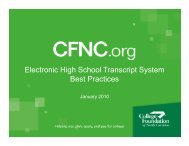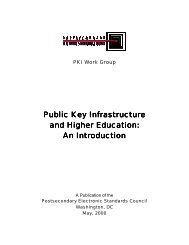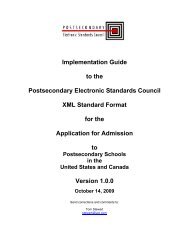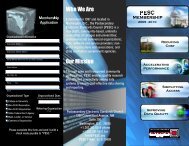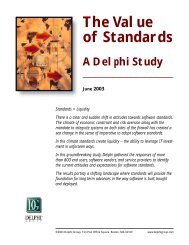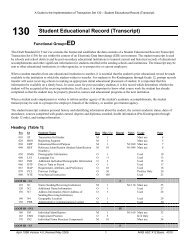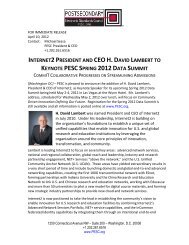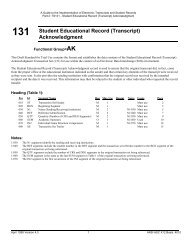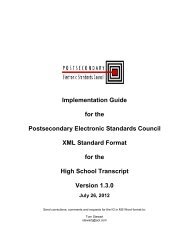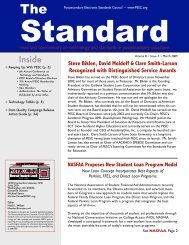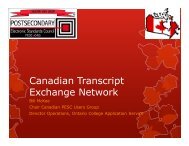February 2013 - PESC
February 2013 - PESC
February 2013 - PESC
Create successful ePaper yourself
Turn your PDF publications into a flip-book with our unique Google optimized e-Paper software.
FEB RUA RY 2 013<br />
Th e STANDARD NEWS A ND C OM M ENTA RY ON T EC HNOL OGY & STA NDA RDS IN EDUCA T ION<br />
digital tools and pedagogies to widen these<br />
traditional horizons, thereby better addressing<br />
21st-century learner interests, styles and lifelong<br />
learning needs.<br />
Ideally, they will also suggest and support new<br />
forms of interdisciplinary and cross-disciplinary<br />
inquiry that are independent of old gatekeepers<br />
such as academic institutions or disciplines,<br />
certification agencies, time-to-degree<br />
measurements, etc.<br />
Hybrid learning<br />
Freed from time and place, online learning should<br />
nonetheless be connected back to multiple<br />
locations around the world and not tethered<br />
exclusively to the digital realm. This can happen by<br />
building in apprenticeships, internships and<br />
real-world applications of online problem sets.<br />
Problem sets might be rooted in real-world<br />
dilemmas or comparative historical and cultural<br />
perspectives. (Examples might include: "Organizing<br />
Disaster Response and Relief for Hurricane Sandy"<br />
or "Women's Rights, Rape, and Culture" or<br />
“Designing and Implementing Gun Control: A<br />
Global Perspective.")<br />
Persistence<br />
Learning is emergent, a lifelong pursuit, not<br />
relegated to the brick walls of an institution or to a<br />
narrow window of time during life; it has no<br />
specific end point. The artificial divisions of work,<br />
play and education cease to be relevant in the<br />
21st century. Learning begins on a playground and<br />
continues perpetually in other playgrounds,<br />
individual and shared workspaces, communities<br />
and more. Learning can be assessed but doesn't<br />
aim itself exclusively toward assessment.<br />
Innovation<br />
Both technical and pedagogical innovation should<br />
be hallmarks of the best learning environments. A<br />
wide variety of pedagogical approaches, learning<br />
tools, methods and practices should support<br />
students' diverse learning modes. Online learning<br />
should be flexible, dynamic, and individualized<br />
rather than canned or standardized. One size or<br />
approach does not fit all.<br />
Formative assessment<br />
Students should have the opportunity to revise and<br />
relearn until they achieve the level of mastery they<br />
desire in a subject or a skill. Online learning<br />
programs or initiatives should strive to transform<br />
assessment into a rich, learner-oriented feedback<br />
system where students are constantly receiving<br />
information aimed at guiding their learning paths.<br />
In pedagogical terms, this means emphasizing<br />
individualized and timely (formative) rather than<br />
end-of-learning (summative) assessment. Similarly,<br />
instructors should use such feedback to improve<br />
their teaching practices. Assessment is only useful<br />
insofar as it helps to foster a culture of success and<br />
enjoyment in learning.<br />
Experimentation<br />
Experimentation should be an acknowledged<br />
affordance and benefit of online learning. Students<br />
should be able to try a course and drop it without<br />
incurring derogatory labels such as failure (for<br />
either the student or the institution offering the<br />
course). Through open discussion of the strengths<br />
and weaknesses of programs, the industry should<br />
develop crowd-sourced evaluative guides to help<br />
learners choose the online learning that best fits<br />
their needs.<br />
Civility<br />
Courses should encourage interaction and<br />
collaboration between students wherever it<br />
enhances the learning experience. Such programs<br />
should encourage student contributions of content,<br />
perspectives, methods, reflecting their own<br />
cultural and individual perspectives. Online<br />
learning programs or initiatives have a<br />
responsibility to share those contributions in an<br />
atmosphere of integrity and respect. Students have<br />
the right and responsibility to promote and<br />
33 <strong>PESC</strong> UNLOC K ING T HE P OW ER OF DATA



